Nelson Olmsted is a Actor American born on 28 january 1914 at Minneapolis (USA)
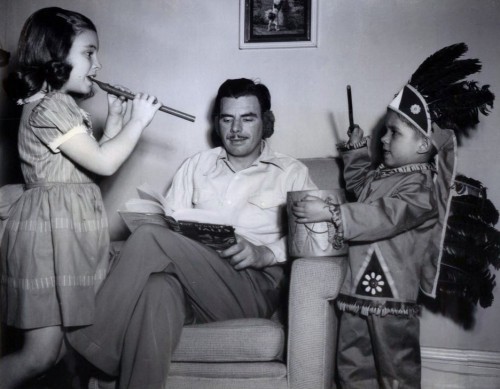
Nelson Olmsted, (January 28, 1914, Minneapolis, Minnesota - April 8, 1992, Torrance, California) was an actor in films, recordings, radio and television from the 1950s to the 1970s. Sometimes billed as Nelson Olmstead, he was best known for an unusual NBC radio series, Sleep No More (1956–57), in which he narrated his own adaptations of terror tales and science-fantasy stories. Ben Grauer was the program's announcer.
After study at the University of Texas, Olmsted began in radio in the late 1930s as an announcer for WBAP in Fort Worth, Texas. When he launched Black Night (1937–39), a late night 30-minute horror series, it was only a local program, but it created a sensation, with mail arriving at WBAP from ten states. A review in Radio News took note of the chilling music (by Gene Baugh) and horrific sound effects (by A.M. Woodford). Produced by Ken Douglass, the series began November 5, 1937 with Edgar Allan Poe's "The Tell Tale Heart" and then continued on with original scripts by Virginia Wiltten. Olmsted starred and was heard in a variety of different roles.
Within a year, the impact of Black Night catapulted Olmsted to New York, where he was immediately established as NBC's resident storyteller, a position he held for over a decade, beginning with The World's Greatest Short Stories (1939, 1944, 1947) and Dramas by Olmsted (1940–41).
Today, Olmsted is best remembered for his spoken word recordings released by the Vanguard Recording Society. One of these was the LP version of Sleep No More! The album's back cover featured a box in which Olmsted delivered a capsule summary of his life:
Now that I think of it, we had a sort of Golden Age of Drama down in Austin, Texas, during those depressed middle thirties. There was the Curtain Club of the University of Texas and Austin’s Little Theatre, and working between them were such aspirants as Zachary Scott, Elaine Anderson Scott, Eli Wallach, Walter Cronkite, Brooks West and Alma Holloway, whom I had sense enough to marry. Most of them came on to New York, fought the actor’s battle, and made it one way or another. I stayed behind with the security of a radio announcer’s job. By the time I moved to WBAP, in Fort Worth, this security was pulling, and the announcer’s life seemed endlessly sterile. What to do about it? Dramatic shows cost money and there were no budgets. The cheapest drama for radio I could think of was good literature, read aloud. Especially the work of that great dramatist who never wrote a play -- Edgar Allan Poe. WBAP gave me some time with which to experiment. That was way back in 1939 -- and it worked. By 1940, the storytelling show was on NBC for a ten-year run. There were a couple of years out for the Army, but even so I managed to tell stories over the Army radio network in Italy. Television brought rough competition to the industry. Rather than fight, I joined by adapting some of the best stories into plays, selling them to Fred Coe, and playing a part in them -- sometimes the lead.
Source : Wikidata
Nelson Olmsted

- Infos
- Photos
- Best films
- Family
- Characters
- Awards
Birth name Leroy Nelson Olmsted, Jr.
Nationality USA
Birth 28 january 1914 at Minneapolis (USA)
Death 8 april 1992 (at 78 years) at Torrance (USA)
Nationality USA
Birth 28 january 1914 at Minneapolis (USA)
Death 8 april 1992 (at 78 years) at Torrance (USA)
After study at the University of Texas, Olmsted began in radio in the late 1930s as an announcer for WBAP in Fort Worth, Texas. When he launched Black Night (1937–39), a late night 30-minute horror series, it was only a local program, but it created a sensation, with mail arriving at WBAP from ten states. A review in Radio News took note of the chilling music (by Gene Baugh) and horrific sound effects (by A.M. Woodford). Produced by Ken Douglass, the series began November 5, 1937 with Edgar Allan Poe's "The Tell Tale Heart" and then continued on with original scripts by Virginia Wiltten. Olmsted starred and was heard in a variety of different roles.
Within a year, the impact of Black Night catapulted Olmsted to New York, where he was immediately established as NBC's resident storyteller, a position he held for over a decade, beginning with The World's Greatest Short Stories (1939, 1944, 1947) and Dramas by Olmsted (1940–41).
Today, Olmsted is best remembered for his spoken word recordings released by the Vanguard Recording Society. One of these was the LP version of Sleep No More! The album's back cover featured a box in which Olmsted delivered a capsule summary of his life:
Now that I think of it, we had a sort of Golden Age of Drama down in Austin, Texas, during those depressed middle thirties. There was the Curtain Club of the University of Texas and Austin’s Little Theatre, and working between them were such aspirants as Zachary Scott, Elaine Anderson Scott, Eli Wallach, Walter Cronkite, Brooks West and Alma Holloway, whom I had sense enough to marry. Most of them came on to New York, fought the actor’s battle, and made it one way or another. I stayed behind with the security of a radio announcer’s job. By the time I moved to WBAP, in Fort Worth, this security was pulling, and the announcer’s life seemed endlessly sterile. What to do about it? Dramatic shows cost money and there were no budgets. The cheapest drama for radio I could think of was good literature, read aloud. Especially the work of that great dramatist who never wrote a play -- Edgar Allan Poe. WBAP gave me some time with which to experiment. That was way back in 1939 -- and it worked. By 1940, the storytelling show was on NBC for a ten-year run. There were a couple of years out for the Army, but even so I managed to tell stories over the Army radio network in Italy. Television brought rough competition to the industry. Rather than fight, I joined by adapting some of the best stories into plays, selling them to Fred Coe, and playing a part in them -- sometimes the lead.
Usually with
Filmography of Nelson Olmsted (13 films)
Actor

Origin USA
Genres Drama
Actors Royal Dano, Lindsay Bloom, Haji, Stuart Lancaster, David McLean, Tony Sirico
Roles Judge
Rating42%





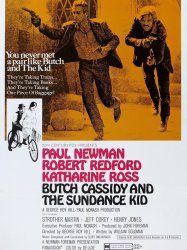 , 1h50
, 1h50Directed by George Roy Hill
Origin USA
Genres Drama, Comedy, Comedy-drama, Action, Adventure, Historical, Crime, Western
Themes Transport films, Films about automobiles, Road movies, Buddy films, Chase films, Gangster films
Actors Paul Newman, Robert Redford, Katharine Ross, Henry Jones, Cloris Leachman, Ted Cassidy
Roles Photographer
Rating79%





In late 1890s Wyoming, Butch Cassidy (Paul Newman) is the affable, clever, talkative leader of the outlaw Hole in the Wall Gang. His closest companion is the laconic dead-shot "Sundance Kid" (Robert Redford). The two return to their hideout at Hole-in-the-Wall (Wyoming) to discover that the rest of the gang, irked at Butch's long absences, have selected Harvey Logan (Ted Cassidy) as their new leader. Harvey challenges Butch to a knife fight over the gang's leadership. Butch defeats him using trickery, but embraces Harvey's idea to rob the Union Pacific Overland Flyer train on both its eastward and westward runs, agreeing that the second robbery would be unexpected and likely reap even more money than the first.
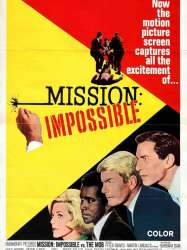 , 1h50
, 1h50Directed by Paul Stanley
Origin USA
Genres Action, Adventure
Themes Spy films
Actors Peter Graves, Martin Landau, Barbara Bain, Greg Morris, Peter Lupus, Vincent Gardenia
Roles Janitor
Rating70%





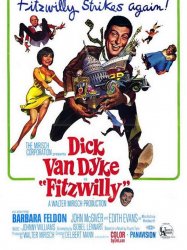
Fitzwilly (1967)
, 1h42Directed by Delbert Mann
Origin USA
Genres Drama, Comedy, Romantic comedy, Romance
Themes Christmas films, Heist films
Actors Dick Van Dyke, Barbara Feldon, Edith Evans, John McGiver, Harry Townes, John Fiedler
Roles Simmons
Rating65%





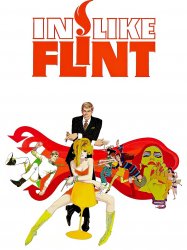
In Like Flint (1967)
, 1h54Directed by Gordon Douglas, David S. Hall
Origin USA
Genres Comedy, Action, Adventure
Themes Spy films
Actors James Coburn, Lee J. Cobb, Jean Hale, Andrew Duggan, Anna Lee, Steve Ihnat
Roles Captain
Rating60%





L’agent Flint découvre que le président des États-Unis est un imposteur. Ce dernier est en réalité un acteur engagé par un groupe de femmes qui tentent de conquérir le monde. Pour ce faire, elles se servent de leurs salons de coiffure pour effectuer des lavages de cerveaux à toute personne s’y rendant…

In Like Flint (1967)
, 1h39Directed by Gordon Douglas
Genres Comedy, Action, Adventure, Spy
Themes Spy films, Seafaring films, Transport films, Political films
Actors James Coburn, Lee J. Cobb, Jean Hale, Andrew Duggan, Herb Edelman, Anna Lee
Roles Captain
Rating60%





After observing the launch of a new space platform, Z.O.W.I.E. (Zonal Organisation World Intelligence Espionage) Chief Lloyd C. Cramden joins President Trent (Andrew Duggan) for a game of golf. While on the links they are interrupted by a small group, two women disguised as boys and an actor disguised as an old man, all from the Fabulous Face organization. Discreetly substituting the presidential golf ball with a small gas bomb they succeed in temporarily immobilizing the presidential party and replacing the president with the now-undisguised actor, who has been surgically altered to look exactly like him. The Fabulous Face organization has conceived a plot to gain control of the world and run it entirely by a group of women led by Elisabeth (Anna Lee); Cramden has more-or-less inadvertently stumbled upon this world-domination plot. The women want to establish a matriarchy, and the first step in their plan is to gain control of a US space facility in the Virgin Islands. Elisabeth has established the spa there as a cover. The women establish their headquarters near the rocket base to brainwash their male-oriented sisters by planting tape recorders in their hair dryers.
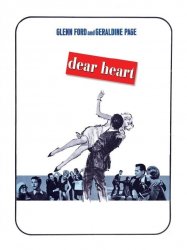
Dear Heart (1965)
, 1h53Directed by Delbert Mann
Origin USA
Genres Comedy, Romantic comedy, Romance
Actors Glenn Ford, Geraldine Page, Angela Lansbury, Barbara Nichols, Charles Drake, Mary Wickes
Roles Herb
Rating71%





Evie Jackson (Geraldine Page) is a middle-aged, single postmaster who is attending a postmasters' convention in New York City. Honest and somewhat tactless, she has many friends but pines for love. Harry Mork (Glenn Ford) is a womanizing advertising executive who is staying in the same hotel while he finds an apartment. Mork is engaged to Phyllis (Angela Lansbury), a woman from Altoona, Pennsylvania. Mork has been told that Phyllis has a son, whom he assumes from a photo is about 13 years old. But the photo is old and her son, Patrick (Michael Anderson, Jr.), is actually 18 years old and a bohemian. Mork is surprised to discover Patrick's true age. He is also embarrassed by Patrick's casual attitude toward women and nudity, and suspicious of Patrick's seemingly platonic relationship with fellow student Émile Zola Bernkrand (Joanna Crawford).
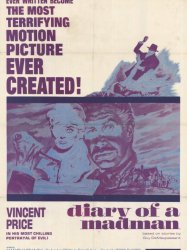
Diary of a Madman (1963)
, 1h36Directed by Reginald Le Borg
Origin USA
Genres Thriller, Horror
Actors Vincent Price, Nancy Kovack, Lewis Martin, Elaine Devry, Ian Wolfe, Stephen Roberts
Roles Dr. Borman
Rating62%





Following the funeral of Simon Cordier (Vincent Price), a French magistrate and amateur sculptor, his secret diary is read out by Simon's pastor friend to a group of people gathered around the table, Simon's servants, and a police captain. The diary transpires that Simon has come into contact with a malevolent entity. The invisible yet corporeal being, called a horla is capable of limited psychokinesis and complete mind control.
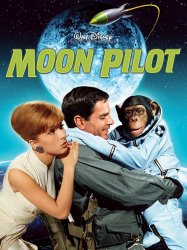
Moon Pilot (1962)
, 1h38Directed by James Neilson, Joseph L. McEveety
Origin USA
Genres Science fiction, Comedy, Comic science fiction
Themes Space adventure films, Sur la Lune, Comedy science fiction films, Political films, Space opera, Children's films
Actors Tom Tryon, Edmond O'Brien, Brian Keith, Dany Saval, Tommy Kirk, Bob Sweeney
Rating54%





Astronaut Capt. Richmond Talbot inadvertently volunteers to make the first manned flight around the moon. He is ordered to keep the upcoming moon flight a secret, even from his family. Due to the classified nature of the mission, he is placed under the watchful eye of several national security agencies.

Lad: A Dog (1962)
, 1h38Directed by Leslie H. Martinson
Origin USA
Genres Drama
Actors Peter Breck, Peggy McCay, Carroll O'Connor, Angela Cartwright, Maurice Dallimore, Alice Pearce
Roles Dog Show Judge
Rating71%






That Touch of Mink (1962)
, 1h39Directed by Delbert Mann
Origin USA
Genres Comedy, Romantic comedy, Romance
Themes Musical films
Actors Doris Day, Cary Grant, Gig Young, John Astin, Alan Hewitt, Dick Sargent
Roles Paul Hackett
Rating65%





Cathy Timberlake, a New York City career woman, meets Philip Shayne. His Rolls Royce splashes her dress with mud while she is on her way to a job interview.

Lover Come Back (1961)
, 1h47Directed by Delbert Mann
Origin USA
Genres Drama, Comedy, Romantic comedy, Romance
Actors Doris Day, Rock Hudson, Tony Randall, Edie Adams, Jack Oakie, Joe Flynn
Roles District Attorney Wesson (uncredited)
Rating70%





In a New York advertising agency, Jerry Webster (Rock Hudson), a Madison Avenue ad executive, has achieved success not through hard work or intelligence but by wining and dining his clients, even setting them up on dates with attractive girls.
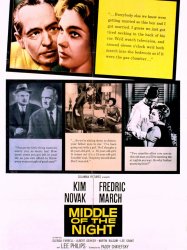
Middle of the Night (1959)
, 1h58Directed by Delbert Mann
Origin USA
Genres Drama, Romance
Actors Fredric March, Kim Novak, Glenda Farrell, Albert Dekker, Martin Balsam, Lee Grant
Roles Erskine
Rating70%





A 24-year-old divorcee, Betty Preisser, a receptionist for a clothing manufacturer, takes some office work home. Her boss, widower Jerry Kingsley, a man of 56, drops by to pick up the documents.
 Connection
Connection

